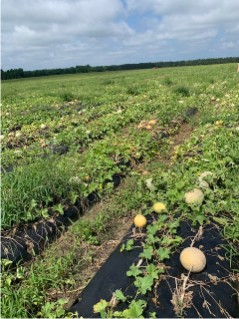Georgia Impacts with Dr. Fonsah
2023 Gloomy Outlook for Georgia Fruit and Vegetable Industry Due to Severe Weather Conditions
By Esendugue Greg Fonsah, Professor and Extension Fruits and Vegetable Economist, Department of Ag & Applied Economics, UGA, Tifton Campus and Theodore McAvoy, Assistant Professor and Vegetable Production Extension Specialist, Department of Horticulture, UGA, Tifton Campus.
Fruit, nuts, and vegetables are the most dynamic and fast-growing industry in Georgia despite its multifaceted challenges. These industries combined farm gate value was $2.25 billion in 2021 which was slightly above 15% of the total Georgia Agricultural Farm Gate value. The fruit and nuts alone contributed $912 million while vegetables generated $1.34 billion. In the fruits and nuts category, peach ranks 3rd as the most important crop, after pecans (1st) and blueberries (2nd) generating 9.3% equivalent to $84.87 million of the total farm gate value of peaches. On the other hand, the top ten vegetables in 2021 were in sequential order, sweet corn, watermelon, onions, bell pepper, tomato, cucumbers, yellow squash, carrots, cabbage, and zucchini respectively. The combined farm gate value of the top ten vegetables was over $1 billion.
The success and failure of this industry depends on weather, which plays a vital role in agriculture. Weather can create opportunities and challenges to farmers depending on the crops grown. Spring 2023 severe weather has been quite a challenge to our Georgia fruits and vegetable growers. For instance, the Georgia peach industry was seriously hit with a combination of warm and cold fronts which completely wiped out the crop.
Furthermore, Georgia vegetable growers have been on the forefront lately with a combination of excessive winds, hail, heavy rains and diseases. The Vegetable Extension Team made of Horticulturists and Agricultural Economists are currently conducting a quick survey to assess the total damages caused by the severe weather.The UGA Specialists and Extension Agents Team have been visiting the most hard-hit vegetable farms in South Georgia to get a hands-on experience which is needed for a diligent appraisal of the situation.
Initial field observations show that several Georgia vegetable crops were heavily affected, such as tomato, pepper, watermelon, cantaloupe and sweet corn, just to name a few. Direct fruit damage from hail, bruising and breaking was observed on multiple fruiting vegetables, i.e., tomato, pepper, watermelon and cantaloupe etc. Secondary infection of hail damaged fruit resulted in soft rot. Near daily rains for two weeks resulted in standing water and widespread phytophthora in watermelon and bell pepper. This pathogen is a water mold and thrives in free moisture. Wind caused lodging which exposed pepper fruit under the plant canopy to the sun resulting in sunburn.
Most of the vegetable crops that were exposed to the severe weather were the later plantings, since the earlier plantings were already harvested. However, the majority of the watermelon crop in Georgia was still on the vine during the severe weather in June. South Georgia experienced a cooler, rainy May which caused watermelon fruit set and maturity to be delayed this year. Georgia watermelon growers usually target the 4th of July market.
The unfavorable weather conditions were also the culprit of other surging diseases such as gummy stem blight, downy mildew and anthracnose irrespective of the expected favorable prices for watermelon and other vegetable crops this season. The combination of unfavorable weather conditions will certainly deprive growers from taking advantage of good prices.
A comprehensive report will be sent out by the UGA Extension Team Leader, Dr. Ted McAvoy, Horticulture Department after the assessment is finalized. In a nutshell, the 2023 spring severe weather will leave an indelible scar impacting the Georgia economy, farm gate value, and worst of all, the growers.
 Ted McAvoy
Ted McAvoy





